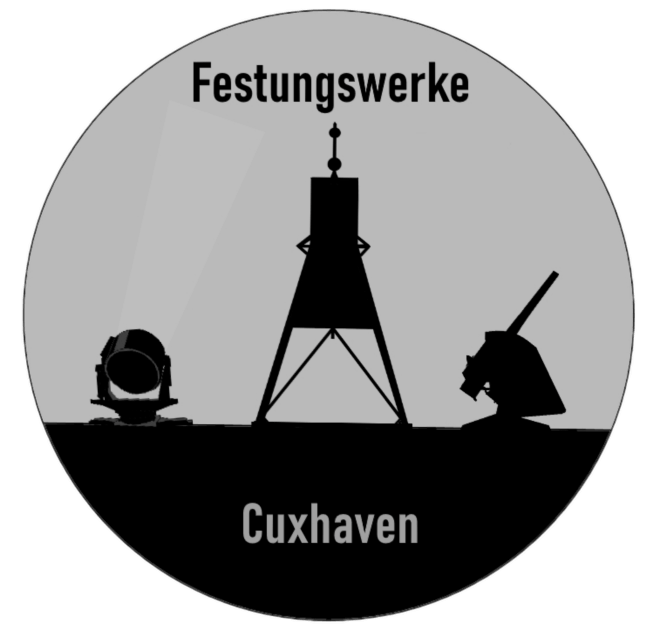Eyewitness report by Robert Albert Lewis Jones "Bob"Royal Army/Great Britain
Quelle: http://www.mooch.org.uk/serious/bob/bob1940s06.htmlMany thanks to "Mooch's Adventures" for providing this report.
After I returned from leave the unit's mission was changed again. It became obvious that with the large number of men in the armed forces in northern Germany an easier route was needed for the leave personnel and also for demobilization. Cuxhaven and Hull were chosen as ports and we moved into the former Grimmershörn barracks in Cuxhaven which was no longer needed by the Kriegsmarine. There were three main barracks blocks, from my room I could look over the sea dike to the mouth of the river Elbe. In the distance I could see the Kugelbake which was a huge wooden structure built as a navigation aid for shipping. If you stood on the flak tower on the roof you could see the beach at Duhnen, the North Sea and on the horizon the island of Neuwerk. Locals told us how the American army decided to conquer the island of Neuwerk. However they declined the offer of a horse drawn wagon which could have easily crossed the mudflats at low tide. The Americans said that a jeep could go anywhere a horse and cart could go. They had to be rescued by the Germans afterwards and the jeep was swamped by the sea. I stifled a laugh.As a tribute to the British forces, the Swedish Lloyd Line provided two ships, the Brittania and the Suisse, to the War Office. These ships were quite luxurious and we were rightly not allowed to board with boots on. We were very surprised to see white linen tablecloths and even bowls of sugar, which was heavily rationed in Britain. It was the only time I can remember officers and privates eating together. Later, a newer and larger ship, the Prinz Eugen, was also in service.While waiting for a ship, they had to provide food, entertainment, accommodation and transport for hundreds of men. This service was then repeated for the men who had returned from leave until they were trucked back to their units.
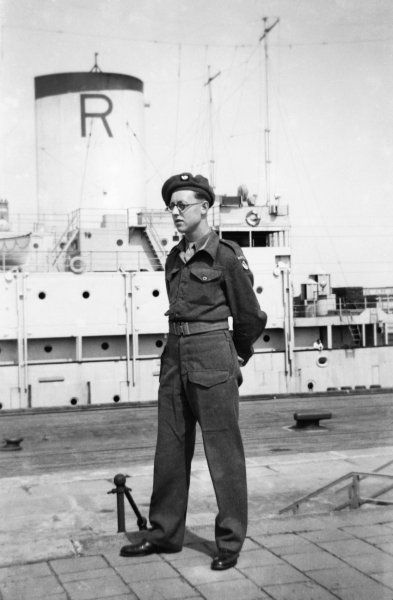
Robert Albert Lewis Jones "Bob" in front of the Empire Rapier in Cuxhaven harbor.
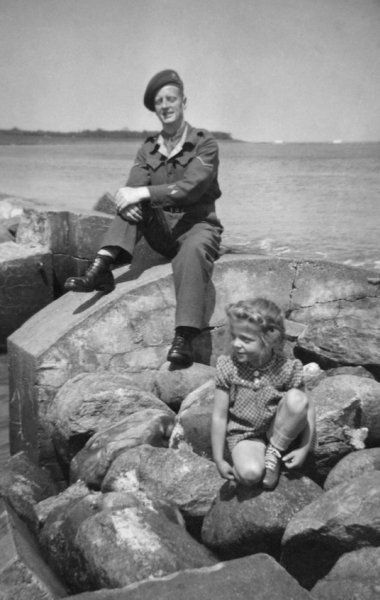
"Ron Smith", in the background the Grimmershörn Bay
Ron and Ken Smith, who came from Luton, were given responsibility for the Control Centre with me. A small number of Royal Navy personnel were ordered to the 126th transit camp in Cuxhaven. Chief Petty Officer 'Gibbie' Gibbs was also ordered to join us in the Control Centre. We had no training and learned as we went. We were given a wooden house in the middle of the barracks, which was heated by a single coke oven.
On the roof was built a lookout tower, designed by me, from which troops could be directed using a loudspeaker system. We also had a record player to play music through this system. A person in charge had to be on duty with another force at all times. Ron and Ken were identical twins and it was not always easy to tell who was on duty. We had a fleet of troop transport vehicles and a company of ex-Wehrmacht soldiers at our disposal. The drivers were all dressed in their smart field grey combat uniforms. The trucks travelled between our control centre and the port. This was guarded by the German police, sometimes our empty trucks stopped to check them. So occasionally it was my turn to ride in the lead vehicle to make sure they got through without any problems. Every day we coordinated how many trucks would be needed when and where. It was the job of Mr Grabe, the head of the drivers, to distribute the appropriate orders. All the drivers called him "Lieutenant", but once when I used this title inadvertently I was reprimanded by a nosy officer. Our transport unit also had a 15 ton truck that Ron, Ken and I could use for our unofficial transports around Cuxhaven. We had several interpreters, but the most important was Helmut Gebhard. A former Focke Wulf Fw190 pilot, he was just waiting for the day the Russians would attack us so he could join the RAF. He never denied being a former Nazi and said that any German who said otherwise was certainly lying. He spoke excellent English and he could make a very good impression with his very aristocratic British officer voice. It was therefore not a good idea to let him run the public address system. The work became routine, counting, stamping papers, issuing free coupons, handing out chocolate and cigarettes, cinema tickets and telling people which accommodation block to go to. One day, out of a sea of faces, I saw someone I recognized. It was one of the 11th KOYLI reinforcements I had landed in France with. It was good to hear that they all survived and ended up in Lübeck on the Baltic coast at the end of the war. The winter of 1945 was quite harsh, the Elbe froze over. However, the ships were still able to break the ice to get to the harbor. It was a white Christmas, a few days before Ron Smith, Bill Cooke and I had been to a church in Cuxhaven. Bill from Chesterfield, who was an organ builder in civilian life, insisted that we go to the organ loft. He played "White Christmas" and I was quite embarrassed that we were not alone. Bill stopped playing and said he would play a hymn, but the German pastor said "No, carry on, because all beautiful music is praise." I was very surprised and hoped that if a British pastor had found German soldiers in his church he would have treated them just as kindly.
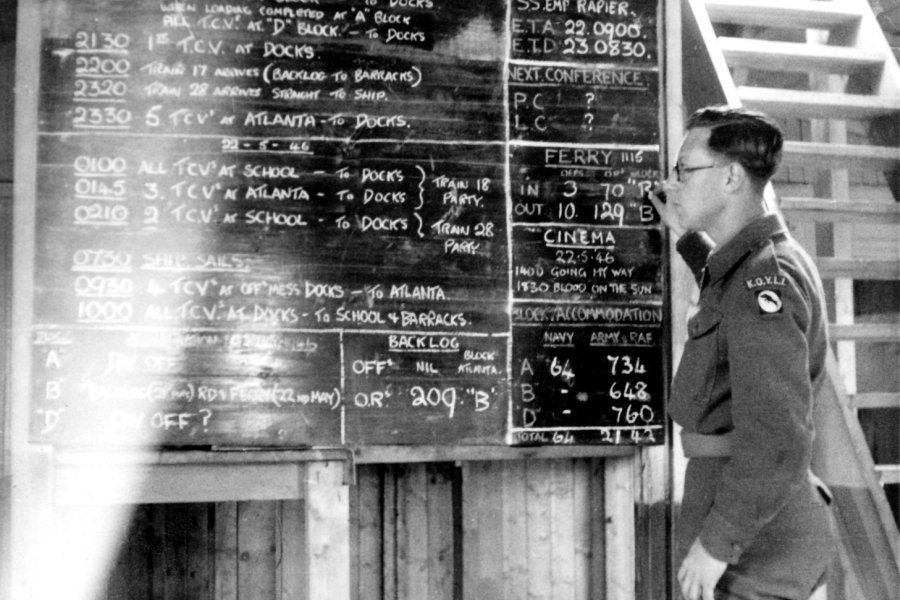
Die Kontrolltafel zeigt Aktivität für den 21/22-5-46 (21. bis 22. Mai 1946). Die Tafel zeigt zu dieser Zeit: 64 Marine und 2142 Armee & RAF in Unterkünften; keine Offiziere, aber 209 andere im Rückstand; der SS -Dampfer "Empire Rapier" war am 22. um 09:00 Uhr fällig und würde am 23. um 08:30 Uhr abfahren; Am 22. zeigte das Kino um 14:00 Uhr „Going My Way“ und um 18:30 Uhr „Blood On The Sun“. Der Hauptteil der Tafel zeigt die Zug- und TCV-Bewegungen. Hinter Bob sind die Stufen zum Aussichtsturm.
Quelle:http://www.mooch.org.uk
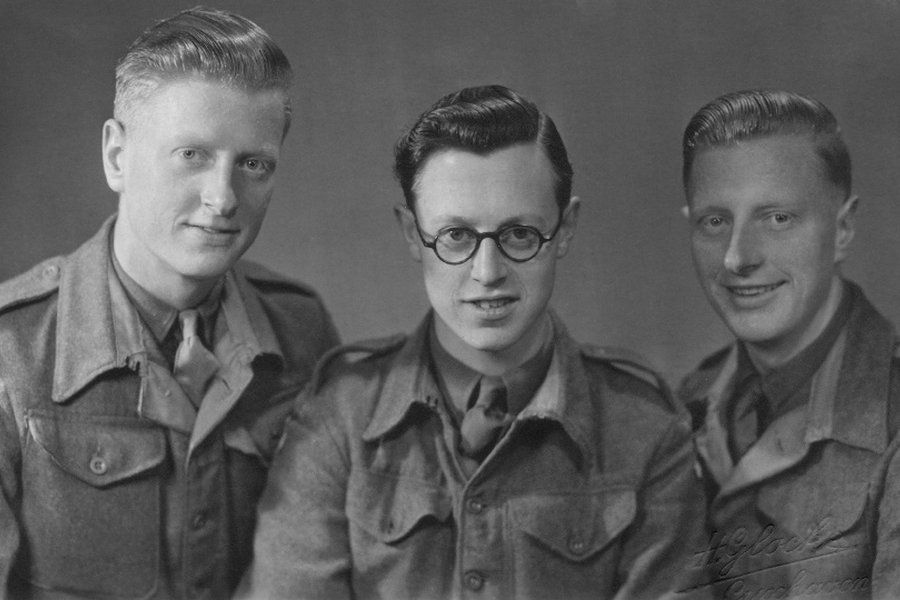
Ron und Ken Smith mit Bob in der Mitte.
The Christmas party was in the port's large Hapaghalle, it was great. Afterwards everyone, including our German workers, went to the local cinema and saw the ghost comedy "Blythe Spirit". It was a great time and I had reason to continue celebrating as I was on home leave from December 28th. I sailed from Cuxhaven to Hull in one of our new ships, the "Empire Rapier". This was a 'Liberty' ship built by the USA during the war. These were mass-produced in welded form and then delivered to Great Britain for hire.
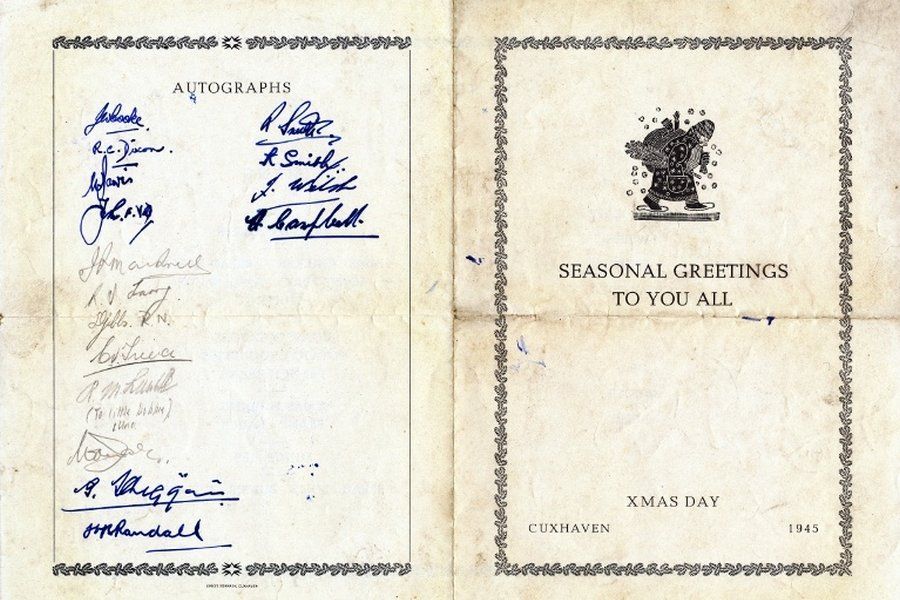
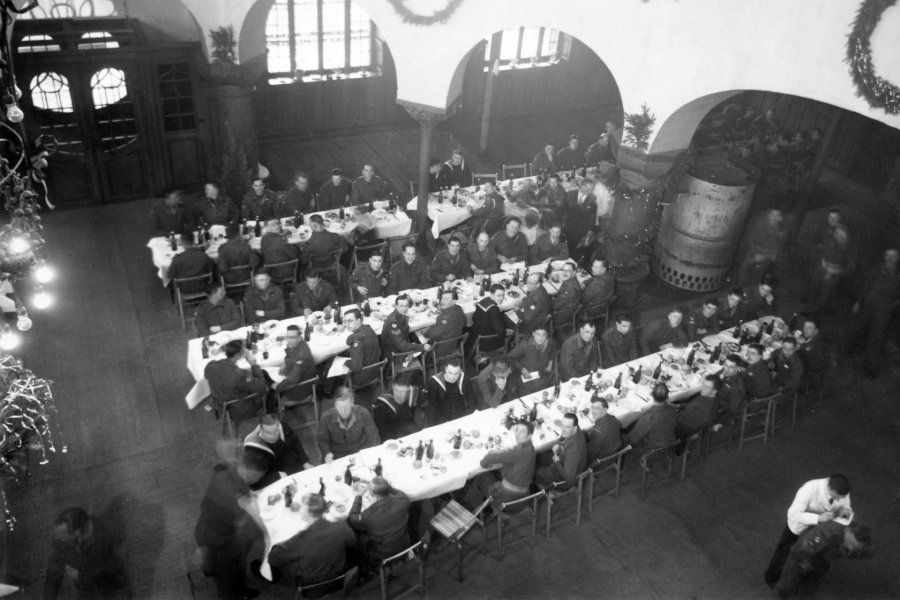
I returned to Cuxhaven from vacation after far too short a time. The ship hit ice off the German coast and eventually we ran into the mouth of the Elbe. The squeaking of the ice on the hull was a deafening noise. Back in the transit camp, my comrades were full of praise for my marriage plans. I therefore claimed my entitlement to marriage allowance to find out when I would receive an AFA22. This was the army form of child benefit. To me, it still looked like a long wait for demobilization. The government had set up a system to reintegrate soldiers into civilian life. Each military member had a code number based on age and length of service. Until then, I had not realized how old some of the others were. Suddenly I realized how many of them had gray and even white hair. So many were demobilized before me because my number was 39. That meant for me, if I was lucky, only one more year in the army. We had a great time in the control center. As long as the troops were moving efficiently, nobody seemed to be really interested in us. There wasn't much to keep the staff entertained, though. Films from the camp cinema were for the troops passing through, so they always saw a different film as long as the program was running for less than three months. I was happy to have a simple change of pace, for example when the German coastal defenses were blown up. I often watched from the barracks roof when the Americans, who had an enclave in Bremerhaven, fired V2 rockets from Nordholz (it wasn't the Americans, but the British with V2 launches from the Wernerwald - Operation Backfire). I spent many hours on the beach just walking on the sand. Ron, Ken and I were often accompanied by a little German girl. She was about five years old, with blonde hair braided on top of her head. She would walk between us holding hands so that we could swing her off the ground as we walked. Every time she landed she would shout "one more time!" Some of our men became "gun freaks" as there were so many handguns in circulation. Many men who came to Cuxhaven on holiday or for the demo had souvenir pistols. But when I told them about the punishments imposed on those caught smuggling weapons into Hull they panicked. I once found a Luger hidden behind a toilet. As I had an almost unlimited supply of 9mm ammunition I was pretty confident with it for shooting at targets floating in the sea.
Almost everyone tried their hand at the black market in some way. We had a free supply of cigarettes, but many of us didn't smoke at all. Cigarettes had become currency for the Germans and were exchanged for watches and cameras. We all banded together to raise enough cigarettes to exchange for a fairly good Blau Punkt radio on site. Our labor force was usually civilians who had been drafted into work or sometimes volunteered. On one occasion I was sent with a comrade to go to the depot camp, which was described as an "Aladdin's cave." I was afraid that the whole thing would go wrong, but we returned safely and everyone was delighted with our new barracks radio. A short time later we learned that it had been stolen from a cafe in the port a few days earlier. We then hid the radio and put our old Volksempfänger back in. Contrary to our British propaganda, it was capable of receiving all British radio stations although it was normally only tuned to BFN (British Forces). When one of my friends became very ill, his parents were called to see him and he told them he had received a lot of pounds sterling. They then asked me for help to take a bottle of perfume home with them. I took the "Stolen Moments" perfume they had bought. I very carefully removed the seal on the box and turned the papers over, put the bottle back and resealed it. I told them that they had to declare the perfume at customs in Hull or it would be confiscated. Then they would lose more than just "stolen moments" if it was opened.
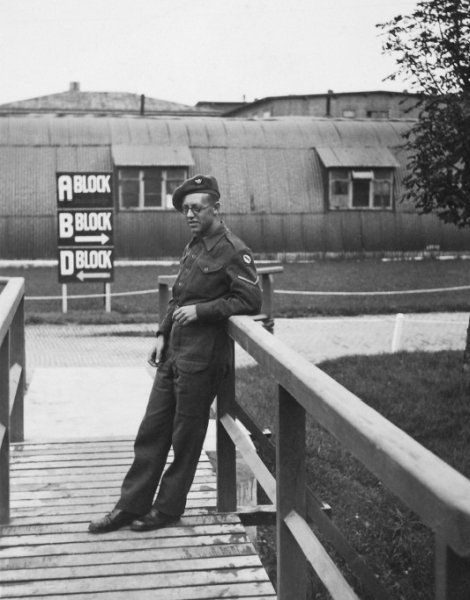
The barracks were probably on the site of the Grimmershörn barracks, so the bridge probably goes over the Wettern. "The wooden bridge crossed the stream that ran through the barracks at Cuxhaven. The stream was a hazard at night after drinking too many schnapps!"
Quelle:http://www.mooch.org.uk
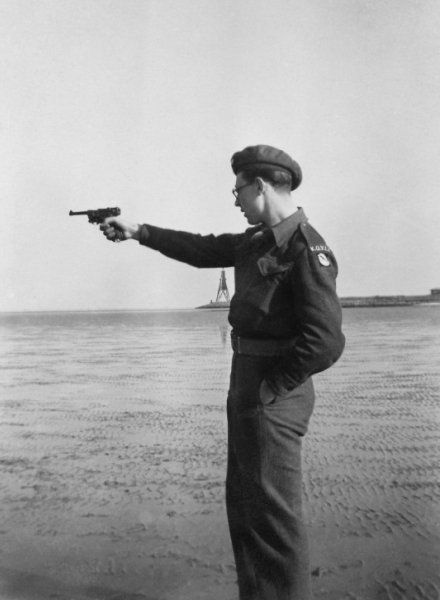
Shortly after the war, it seems that nobody really cared if people shot in the mudflats. "Bob" is trying out his Luger. Source: http://www.mooch.org.uk
There really wasn't much to visit outside of Cuxhaven and the passenger transport was really not ideal. Eventually, however, I made a trip to Hamburg one day. I can't remember what the decision was for not making the trip sooner, but I suppose it was for an eye test or a dentist's appointment. The first Russian soldiers I saw were in a Hamburg Woolworths. On our way back we stopped at a fruit farm and I gave the farmer a bar of chocolate in exchange for a box of plums. A bit of fresh fruit was all we wanted but the farmer thought of a fair payment. Chocolate was worth so much more and he started loading the truck while I tried to tell him we were already satisfied. Meanwhile a military police vehicle followed us from the farm all the way to Cuxhaven and I thought we were in trouble. But probably he had a similar mission to us. In 1946 I had two more holidays in Britain. In April Una and I went to Skegness with Eva and Leonard and their young sons Roger and Martin. Leonard had only just been demobilised. In July we were in Wilford and Watford making plans for the future as the end of my military service was only about two months away. I had always been a rather reserved soldier and was very glad that I had never been promoted. In early September 1946 I was called into the Commandant's office. He said that in recognition of my work in the Orderly Room I would be made a Corporal. I was not impressed as he did not even know what department I was in. Unpaid as an acting Corporal for five years made me tempted to say "Big deal". However he then said "Paid and backdated for four months" and I could not refuse the money.
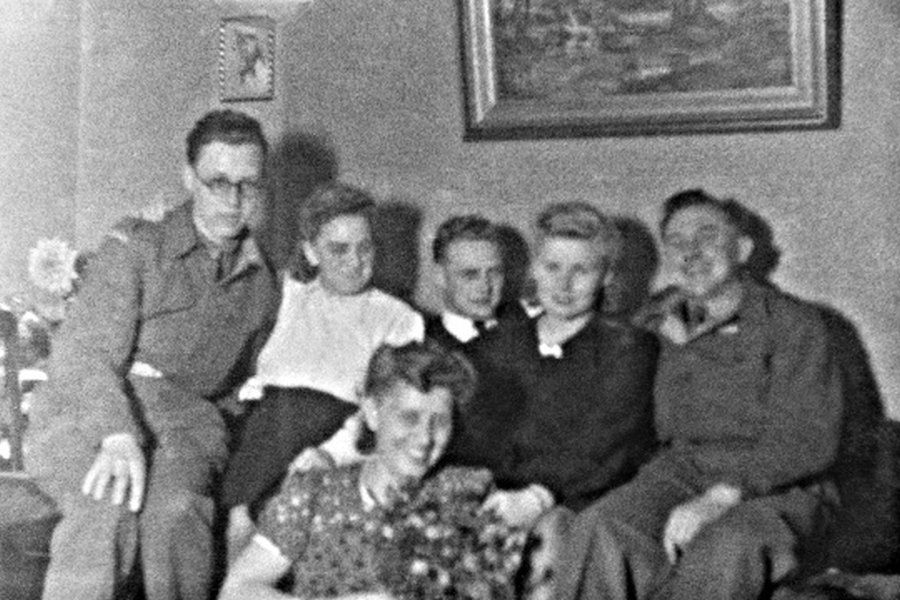
Picture above: "Bob" with Mrs. Kämmerer and friends. Picture right: A remaining 20 mm Flak/Oerlikon in the Kugelbake battery.
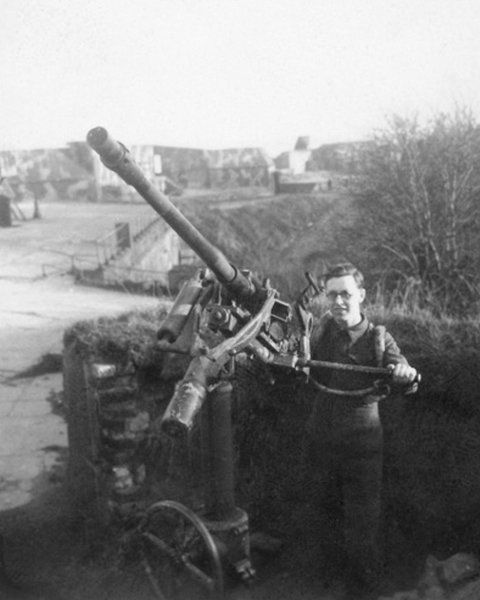
I had been in Cuxhaven for just over a year now and had made many friends and although I was glad to be going home I had the sad task of saying goodbye to those who meant something to me. I then visited the Kämerrer family for the last time. Mrs Kämerrer did the laundry for some of us. Mr Kämerrer had been a submariner and they had a son Peter who was about four years old. I promised Ron and Ken that I would keep in touch with them and as their home was in Luton it should not be difficult. My last task was to make sure my Luger did not fall into the wrong hands. I then dismantled it into all its parts and took a final walk around Cuxhaven so that I could lose the pieces on waste ground, in the sand and in the sea. I went to Hull on 23 September 1946 and then by train to the Military Disembarkation and Distribution Unit in Guildford. I was given a grey civilian suit, which was not bad but not memorable. The tie I chose was the brightest pink I could find. I remember that tie vividly! I was on paid leave until December 5th, when I was transferred to the Class Z (T) Reserve, and I was in the Army for five years. If you ask me what I did in the war, I can only say that I had certainly gained weight. When I was drafted I was quite a beanpole, as my weight at the time was only 122 lbs. I had survived a major war unscathed, which I had thought impossible when I left for France. I had not even fired at the enemy and no, no one had shot at me. I had travelled a little and learnt a lot. The biggest and most important event in those years was that I had met Una. Now she was my wife and we are together. A new phase of life had begun.


